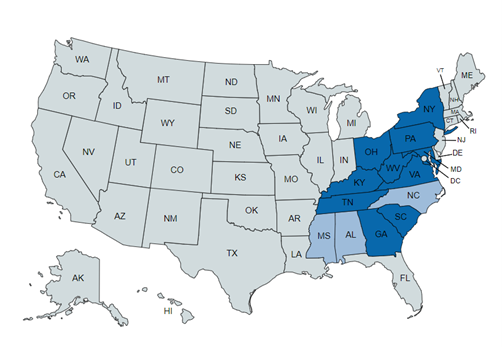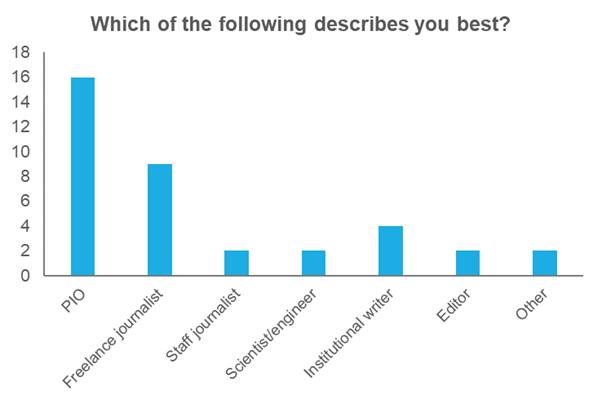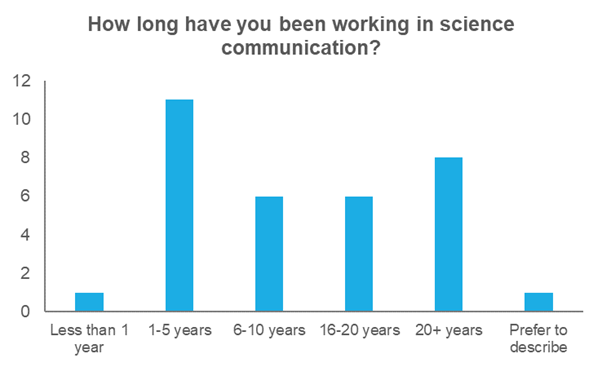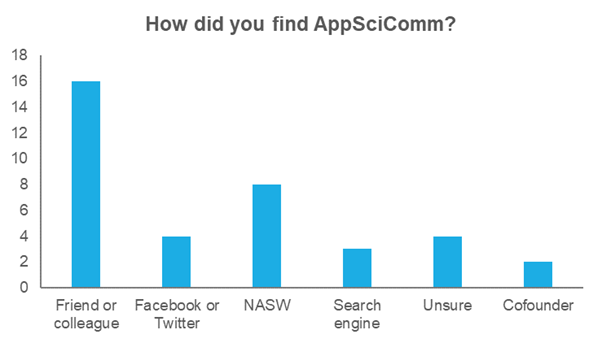2023 AppSciComm member survey, executive summary
- appscicomm
- Sep 7, 2023
- 3 min read
In June and July of 2023, AppSciComm conducted an online survey to learn more about who our members are, what they hope to get out of membership and the types of events and activities they want to see more of in the future. We sent the survey by email to members on our distribution list and through our Facebook group. Of approximately 90 members, 33 completed the survey.
Our members span a wide range of Appalachia
Members who completed the survey are based in 10 out of 13 states in Appalachia. We didn’t have any survey participants from North Carolina, Mississippi or Alabama. Almost half of participants (16) are from Pennsylvania, and 13 of these are based in Pittsburgh, the largest city in Appalachia. About one fifth (7) of participants are based in Tennessee.
Our members have varied scicomm roles and experience
20 participants identified as public information officers (PIOs) or institutional writers, while 11 were freelance or staff journalists. Two participants described themselves as scientists or engineers interested in science communication.
Members are interested in virtual and in-person events

94% (31/33) of members would be interested in attending future in-person events, including a professional development day or conference, science-related excursions such as a museum tour, member happy hours and scientist talks. One participant suggested other ideas of a book launch and a Q&A with science writing professionals.

26% of participants said that they would only attend in-person events in the town that they lived. 35% would travel up to 50 miles, 13% would travel up to 100 miles and just 3% would travel more than 100 miles. Of the 23% of participants who said it depended, one participant said it would be too far to travel to Pittsburgh but would like to meet up at conferences such as NASW. Others said that they would potentially travel to Pittsburgh if the event was “worth it” — perhaps for a full-day professional development event but not a happy hour — or depending on their institution’s budget or their schedule.

94% (31/33) members are interested in attending future virtual events, including scientist talks, professional development sessions, Q&As with reporters and authors, book club discussions and science-themed trivia. One person suggested a storytelling workshop as an additional idea.

Weekday lunchtime, afternoons and evenings were the most preferred times for virtual events to take place, while weekday mornings and weekends were less popular.
What excites you most about being a science communicator?
We asked our members to share what they found most exciting about being a science communicator. Most responses touched on one or more of three themes: the enjoyment and privilege of constantly learning new things, talking to people who are excited about their work and the opportunity to share exciting new discoveries and inspire others.
“The chance to make science exciting and enlightening for a broad audience -- and the privilege of constantly learning”
“The possibility that what I do inspires someone to learn more, whether that's a kid who decides to become a scientist, a scientist connecting with another scientist, a grandmother sharing what she reads with her grandchildren, a patient looking for better treatments, etc.”
“Sharing the discoveries of science and how they can help humanity”
“Getting a glimpse of the future today, and sharing it.”
AppSciComm members are looking for community, connections and professional development
We asked survey participants to share what they hope to get out of being members of AppSciComm. Most responses mentioned community, friendship, connection with peers in the region, sharing of knowledge and resources, new experiences, professional development and networking.
“Understand more about environmental reporting/scicomm in rural areas; the challenges and best practices on making long-lasting community relationships that builds trust.”
“I originally thought this group was for opportunities to increase scicomm in Appalachia - like certain outlets for scicomm or challenges that come with being a scicommer in Appalachia. I'm surprised that I haven't seen anything like that from this group given the science illiteracy in the area due to poor education. I was hoping for a deeper focus on Appalachia and the people we serve.”
“I hope to keep science communicator jobs in Appalachia by giving the people doing these jobs a community they can turn to with questions and learn from/be inspired by. I think that the best way to reach your audience is to live among them. Appalachians have a historic (and well-earned) distrust of outsiders. If all the science news Appalachia receives comes from people living outside Appalachia, that could lead to distrust of science, scientists, public health, etc.”












Comments